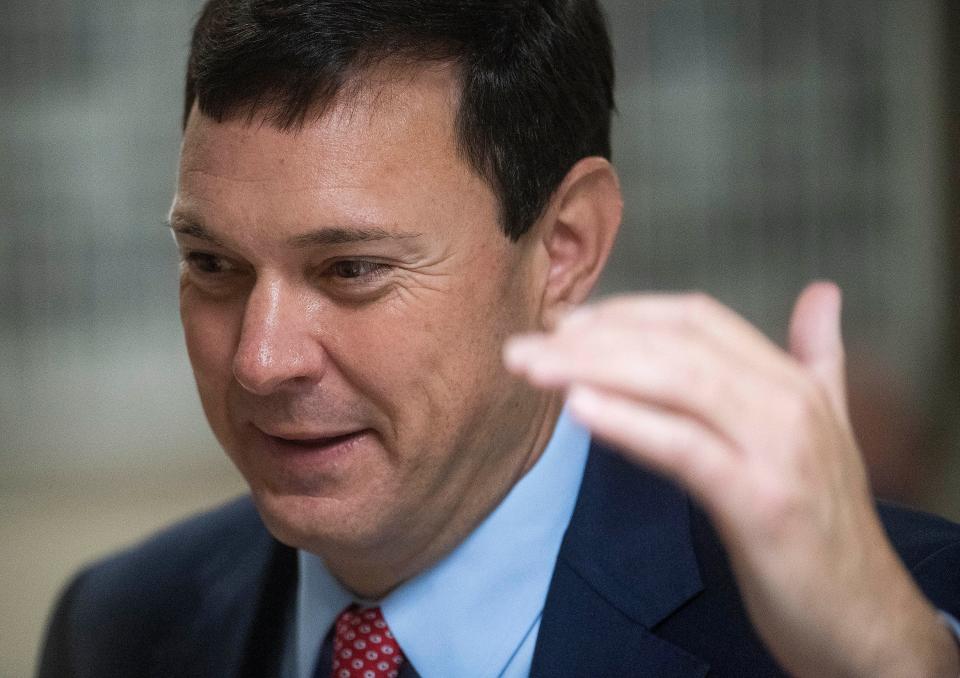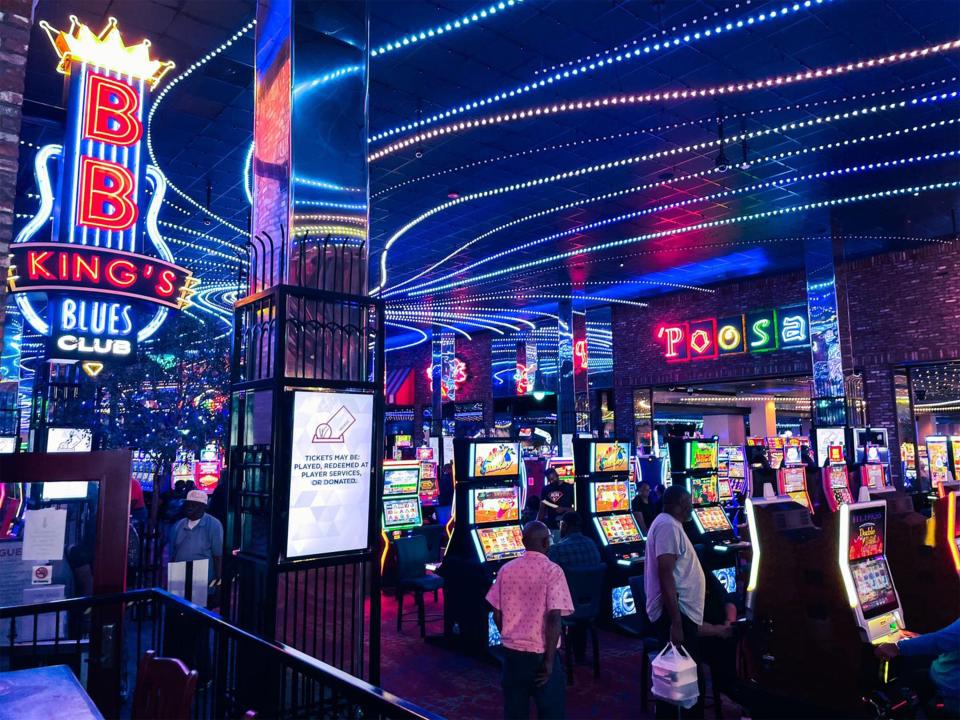As Alabama legislators work on gambling bill, opponents draw lines
- Oops!Something went wrong.Please try again later.
Alabama legislators will try once again to tackle gambling in the state in the coming session. And gambling opponents are getting ready.
Two Republican state representatives are writing a bill that would strengthen enforcement against illegal gambling in the state and create legal gambling at a limited number of locations, including a possible state lottery.
But Reps. Chris Blackshear, R-Smiths Station, and Andy Whitt, R-Harvest, the two lawmakers working on the bill, insisted in separate interviews that the proposal is not an expansion of gambling, but aimed to take what they called a comprehensive approach to the topic.
“We will be drastically reducing the number of locations that you can voluntarily go in and play a game,” Blackshear said. “At those locations you voluntarily walk in to play a game, you may potentially have more options of playing than you currently do.”
Blackshear, the bill’s lead sponsor, said that the bill will have at maximum a “very minimum number of licensed” casinos; online sports betting and a lottery to support education.
“But, definitely, I’m going to make sure I’m clear, definitely, no casino i-gaming forms allowed on your cell phones,” he said.

The details about which budget non-lottery revenue will go to are still getting ironed out, Blacksher said.
The bill had not been finalized as of Thursday morning. Whitt and Blackshear said that the legislation is being crafted by lawmakers and not outside groups.
“This is truly drafted by legislators,” said Whitt.
Blackshear and Whitt’s efforts are the latest to try to come up with a gambling settlement in the state, a goal that has proven elusive amid industry rivalries and divisions among Republicans.
The Legislature approved an amendment that would have created a state lottery in 1999, but voters rejected it that fall. In 2016, a lottery bill fell apart after House members removed language that would have allowed electronic options. Democratic senators, key to the bill’s passage, then withdrew their support, citing concerns that a paper-only lottery might affect the kinds of gambling machines casinos in their districts could offer.
In 2021, legislation that initially would have created a lottery; established five casinos in the state and created sports betting won the support of the industry and several senators, but collapsed amid questions over what would happen to existing gambling facilities not included in the bill. A second attempt to pass the bill made it out of the Senate but was gutted in the House. Republicans in that chamber attempted to turn the legislation into a lottery-only bill, but failed to advance it.
Blackshear said that 10 people in Alabama would have 10 different answers to the question of what legal and illegal gaming is in Alabama. He said leaving the issue unaddressed for so long is what has led to their current situation.

The gambling landscape
The Legislature cannot authorize gambling on its own. Alabama’s 1901 Constitution bans lotteries and gambling. Any lottery or gambling proposal must pass in the form of a constitutional amendment. Constitutional amendments must be approved by state voters.
Local constitutional amendments have authorized gambling in some counties, though the Alabama Supreme Court has taken extremely narrow readings of what games can be offered in those state establishments. VictoryLand in Macon County and Greene County Entertainment in Greene County, located in the former home of GreeneTrack, offer gambling.
The Poarch Band of Creek Indians, a federally-recognized tribe, operates casinos in Atmore, Montgomery and Wetumpka. Under federal law, the Poarch Band can operate what are known as Class II games, such as electronic bingo. To offer traditional gambling like slot machines and table games, classified as Class III gaming, the Poarch Band would have to negotiate a compact with the governor.
In the past, rivalries and mistrust between the Poarch Band and gaming facilities operating under state law have made it difficult to pass lottery bills. The 2016 lottery proposal failed in part because VictoryLand and GreeneTrack feared that a paper-only lottery, a form of Class III gambling, would allow the Poarch Band to install gaming machines known as Video Lottery Terminals (VLT) that would be denied to them.
In response to emailed questions, a spokesperson for the Poarch Band wrote that the tribe operates within “a highly regulated framework for tribal gaming under federal law” and that they could “only support legislation that ensures any other gaming in the state is also regulated within the context of the law, and that is why we’ve always kept the lines of communication open regarding a compact.
The spokesperson wrote that that clear regulations would help prevent illegal gambling operations.
“We support a comprehensive gaming plan that should include a compact with the Poarch Band of Creek Indians, a lottery, regulated gaming (with rules, revenues, and rewards), and sports betting,” they wrote.
Messages seeking comment were left with VictoryLand and Greene County Entertainment.
Divisions
Other interest groups in the state have taken a stance against gambling.
Mary Wilson, communications outreach director for the Alabama Farmers Federation, which has significant influence with Republican lawmakers, cited a policy approved by members of the group that says they will work to “prevent the passage or limit the expansion of gambling in the state.”
“We support engaging with political partners to prevent the passage or limit the expansion of gambling in the state,” said the policy. “We support full enforcement of Alabama’s laws related to gambling. We oppose gambling in all forms including casino gaming, a state lottery, sports betting, electronic gaming, and online gambling.”
The Alabama Policy Institute, a right-leaning think tank based in Birmingham, opposes gambling.
“Gambling is a bad bet for Alabama families,” the website reads. “Suggesting that it is an issue that is ‘left up to the voters’ is not an appropriate response for a conservative legislator. Any attempts to expand gambling or establish a state-run lottery should be rebuffed.”
Democrats in both chambers broadly support a lottery and gambling, while Republicans in the House and Senate often have differing views on the shape of a comprehensive package. Some House Republicans strongly oppose any expansion.
Sen. Greg Albritton, R-Atmore, a longtime proponent of gambling legislation whose district includes the home of the Poarch Band of Creek Indians, was hopeful about passing a gambling bill this year, and that there have been discussions with House members.
“I don’t know if the House and the Senate are ever on the same page,” he said. “But I think we are closer on this topic than we’ve ever been.”
Albritton has previously told the Reflector he might sponsor a comprehensive package this year.
In the past, Republican divisions have required gambling bill supporters to secure Democratic votes. But two Democratic legislators whose district includes VictoryLand said last week they had not yet been consulted on the proposal.
Rep. Pebblin Warren, D-Tuskegee said that she has not seen any bill yet. She’s hopeful that she will get to see the legislation soon because she expects the bill to be a lengthy one.
“Because if it’s put out there fast on a fast track, it’s going to be a bad piece of legislation that we’re not going to have a chance to really see and analyze,” she said.
Sen. Billy Beasley, D-Clayton, said he had “not directly” spoken to Republican legislators on a gambling proposal.
Rep. Reed Ingram, R-Pike Road, an opponent of gambling, said he could support enforcement provisions but doesn’t like the other elements or the timing of the bill.
A gambling bill that came out of the Legislature would likely be put on November’s ballot, when the presidential election is expected to result in large turnout.Ingram said that could affect the outcome of the 2nd Congressional District, currently held by U.S. Rep. Barry Moore, R-Enterprise but redrawn in a way that is likely to favor a Democratic nominee. (Moore is now running for the Republican nomination in the 1st Congressional District.)
Ingram, whose state House district is in the 2nd and 3rd congressional districts, said Republicans are “holding on (to the 2nd Congressional District) by the skin of our teeth.”
“We can’t lose any votes on that,” he said.
But Ingram said he was not currently leading opposition efforts and was waiting to see the bill that emerges.
The Alabama House has historically been where gambling legislation has gone to die.
“They didn’t have any trouble in the House,” Albritton said. “The House just never bothered to vote on them.”
Blackshear said that he and Whitt have not had a lot of conversations with the Senate and are looking for a sponsor in that chamber.
“My perspective of the Senate is a lot of their members are in a wait and see mode,” he said. “What is the House going to do? You know, they’ve stuck their neck out there multiple times. We’ve never reciprocated. So, I think the only way it’s fair is we have to show the Senate that we’re ready to play ball in the House.”
Alabama Reflector is part of States Newsroom, an independent nonprofit website covering politics and policy in state capitals around the nation.
This article originally appeared on Montgomery Advertiser: As Alabama legislators work on gambling bill, opponents draw lines

